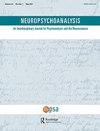Time and the dream
Q3 Psychology
引用次数: 1
Abstract
ABSTRACT This paper is a contribution to a theory of duration and subjective time in dream and waking consciousness. According to microgenetic theory, an act of thought begins, Wittgenstein wrote, and psychoanalysts would agree, as would I, with instinct as the animal inheritance traverses the evolutionary core of the brain, the drives arousing acquired experience and knowledge. These strands of the inherited and acquired constitute the core self, the “me,” which is bound up with bodily function, immediacy and the largely innate determinants of behavior. This construct passes a liminal threshold leading to a conscious self in relation to desire for objects or conditions in the future. Thus, the self appears early in the mental state prior to thought and the endpoint of object-perception. A mental state enfolds a transition from instinct to thought to perception in a fraction of a second. The partial overlap of early segments in a series of mental states arouses preliminary phases out of which thoughts and perceptions actualize. Long-term or experiential memories, revised but not erased by the oncoming state, serve as a foundation for thought and perception, while segments at the surface or endpoint of the state that transition to an object, which are not enfolded in the overlap, are receptive to new perceptions. In dreaming, the specious or illusory present arises in the overlap of mental states and the incomplete revival of their predecessors. Incompleteness of revival is the key to recall as fading states lapse to successive planes of iconic, short- and long-term memory. The present arises in the forgetting of perceptions, or the passage of perceptual to memorial content, as the disparity between the floor of the mental state – the endpoint of withdrawal beneath recall – and conscious revival – the ceiling of the mental state – in the final actuality. This disparity is converted to a longitudinal epoch of duration. The degree to which each state is revived – the forgetting of each state, in dream and waking – accounts for the rapid decay in dream recall on waking, as well as the predominance of imagery.时间与梦想
本文是对梦与醒意识的持续时间和主观时间理论的贡献。维特根斯坦写道,根据微遗传学理论,一种思维行为开始了。精神分析学家和我一样,都同意,当动物遗传穿越大脑的进化核心时,本能会激发获得的经验和知识。这些遗传和获得的部分构成了核心自我,即“我”,它与身体功能、即时性和行为的主要先天决定因素密切相关。这个构念通过了一个阈值,导致与对未来物体或条件的渴望有关的有意识的自我。因此,在思想和客体知觉的终点之前,自我出现在精神状态的早期。一种精神状态包含了从本能到思想再到感知在一瞬间的转变。在一系列心理状态中,早期部分的部分重叠引起了思想和知觉实现的初步阶段。长期记忆或经验记忆,经过修正,但不会被即将到来的状态抹去,作为思想和感知的基础,而在状态的表面或端点过渡到一个对象的片段,不包含在重叠中,可以接受新的感知。在梦中,似是而非或虚幻的现在物出现在精神状态的重叠和它们之前的不完全复活中。复苏的不完全性是回忆的关键,因为衰退的状态进入了标志性的、短期和长期记忆的连续平面。当下产生于知觉的遗忘,或知觉到记忆内容的通道,就像精神状态的底部——回忆下的退缩的终点——和意识的复兴——精神状态的天花板——在最终的现实之间的差异。这个差距被转换成一个纵向历元的持续时间。每一种状态被恢复的程度——无论在梦中还是醒着时对每一种状态的遗忘——解释了醒着时梦境记忆的迅速衰退,以及意象的主导地位。
本文章由计算机程序翻译,如有差异,请以英文原文为准。
求助全文
约1分钟内获得全文
求助全文
来源期刊

Neuropsychoanalysis
Psychology-Neuropsychology and Physiological Psychology
CiteScore
2.50
自引率
0.00%
发文量
24
 求助内容:
求助内容: 应助结果提醒方式:
应助结果提醒方式:


